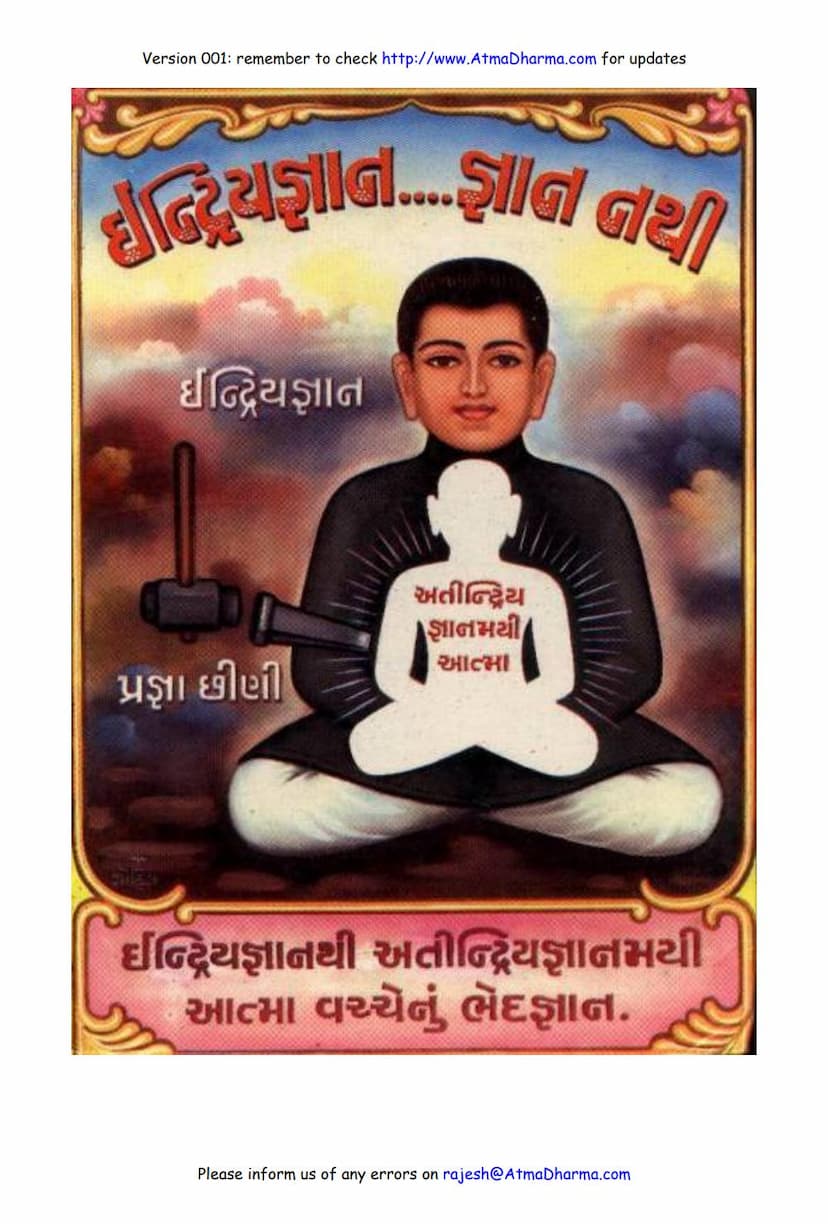Indriya Gyan
Added to library: September 1, 2025

Summary
Here's a comprehensive summary of the Jain text "Indriya Gyan... Gnān Nathi" (Sense Knowledge is Not Knowledge), based on the provided pages:
Title: Indriya Gyan... Gnān Nathi (Sense Knowledge... is Not Knowledge)
Author: Sandhyaben
Publisher: Digambar Jain Mumukshu Mandal, Himmatnagar
Core Message: The central thesis of this text is that sense knowledge (Indriya Gyan) is not true knowledge (Gnān). It aims to differentiate between empirical, sensory perception and the ultimate, pure knowledge of the soul, emphasizing the latter as the path to liberation.
Key Concepts and Arguments:
-
The Illusion of Sense Knowledge: The text repeatedly argues that knowledge gained through the five senses and the mind (Indriya Gyan) is fundamentally flawed and misleading. It is described as:
- Perishable and Inferior: Unlike the eternal and unchanging nature of the soul, sense knowledge is temporary, impermanent, and ultimately not conducive to true spiritual progress.
- Deceptive and Ignorant: It creates attachment and aversion, leading to the cycle of birth and death. It is not the knowledge of the soul's true nature.
- External and Dependent: Sense knowledge relies on external sense organs and objects, making it impure and dependent, unlike the self-reliant nature of the soul's pure knowledge.
- Merely Provisional: The understanding gained through senses is considered a superficial or provisional knowledge, not the ultimate reality.
-
The Nature of True Knowledge (Ātmān Gyan): The text contrasts sense knowledge with the true, intrinsic knowledge of the soul (Ātmān Gyan). This true knowledge is characterized as:
- Pure and Omniscient: It is the inherent nature of the soul, existing eternally and all-pervading.
- Self-Contained and Self-Evidencing: It does not require external aids like senses or scriptures for its realization. It is realized through introspection and self-awareness.
- Blissful and Peaceful: True knowledge leads to liberation from suffering and the experience of eternal bliss.
- Beyond Description: It is transcendental, beyond the grasp of senses, mind, and even scriptural discourse.
-
The Path to True Knowledge: The text emphasizes the importance of:
- Discrimination (Bhed Gyan): Recognizing the fundamental difference between the soul (Ātmā) and the sensory world (Indriya Gyan, sense objects, body, mind, karma, etc.).
- Detachment from the Senses: Consciously withdrawing the focus of awareness from external objects and sense experiences.
- Introspection (Antarmukh): Turning the gaze inward to realize the soul's true nature.
- Self-Reliance: Understanding that liberation and true knowledge come from within, not from external aids like rituals, scriptures alone, or even the teachings of spiritual masters if not internalized.
-
Critique of Externalism: The text strongly criticizes reliance on external actions, rituals, and scriptural knowledge for spiritual attainment. While scriptures and teachings are a starting point, they are not the end goal. True realization comes from direct experience of the soul through introspection.
-
The Role of Spiritual Masters: The teachings of revered spiritual masters like Pujya Gurudev Shri Kanji Swami and Shri Kundakundacharya are highlighted as guiding lights. They are credited with illuminating the path and distinguishing between true knowledge and the illusions of sense perception.
-
The Concept of "Jina": Those who have conquered their senses (Jitendriya) and realized the soul's true nature are referred to as "Jina." This conquest is achieved not by suppressing the senses, but by transcending their limitations through self-realization.
-
Key Principles Emphasized:
- "I am the knower, not the doer" (હું જાણનાર છું, કરનાર નથી): This is presented as a core tenet of Jain philosophy, highlighting the soul's nature as a pure experiencer, not an agent of actions.
- Rejection of Sensory Knowledge: The book consistently refutes the validity of knowledge derived from the senses, labeling it as "maya" (illusion) or "mithya" (false).
- Focus on Internal Experience: The ultimate goal is the direct, experiential realization of the soul, which is described as blissful and eternal.
Structure and Content:
The text is structured as a compilation of quotes, verses, and commentaries from various Jain scriptures and great saints, all supporting the central theme that Indriya Gyan is not true knowledge. The extensive citations from texts like Svatmasiddhishastra, Samaysara, Pravachansara, and the teachings of Pujya Gurudev Shri Kanji Swami, among others, serve to reinforce the argument from multiple authoritative sources. The repetitive nature of these citations underscores the paramount importance of this distinction in Jain spiritual practice.
Overall Message:
"Indriya Gyan... Gnān Nathi" is a profound spiritual discourse that guides the reader away from reliance on the external world of senses and towards the inner realization of the soul. It emphasizes that true knowledge, liberation, and lasting happiness are found not in the fleeting perceptions of the senses, but in the pure, eternal consciousness of the soul. The text serves as a call to introspection and self-discovery, urging individuals to look within for the truth rather than seeking it externally.